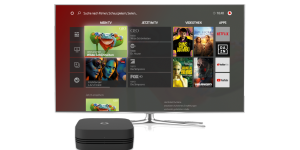
After more than 40 years of operation, DTVE is closing its doors and our website will no longer be updated daily. Thank you for all of your support.
Vodafone Deutschland moves forward with TV harmonisation and high-split plan
Vodafone Deutschland is moving into the second phase of its plan to digitize its radio offering and harmonise TV frequencies to free up bandwidth for better quality broadband.
 Following changes last year to the TV signals received by seven million of Vodafone’s 13 million homes change frequency, the company is moving ahead to harmonise frequencies and also to shut down analogue radio services in the remaining areas in which it operates.
Following changes last year to the TV signals received by seven million of Vodafone’s 13 million homes change frequency, the company is moving ahead to harmonise frequencies and also to shut down analogue radio services in the remaining areas in which it operates.
The second phase of changes kicks off in the states of North Rhine Westphalia, Hesse and Baden-Württemberg, where it acquired the former Unitymedia networks of Liberty Global. The service provider has already switched off analogue radio in the cable network in parts of Erkrath and the Mettmann district and plans to extend this to t8he remaining areas of the three states by the end of this year.
Vodafone has already switched off analogue radio in Germany’s other 13 Federal states.
Vodafone’s TV signals will change frequency over time, with most Vodafone and Sky set-tops completing the change automatically.
The company is also moving ahead with the introduction of a high-split in its network – meaning use of the 204MHz frequency to increase the upstream spectrum range.
“The conversion of the TV frequencies is an important step so that we can further develop our network in a future-oriented manner. As a result of the conversions to date, we have been able to determine a significant reduction in capacity of up to 20% to 30% in downstream data traffic in many network areas – for the customers that means more stability in the fixed network,” said Tanja Richter, head of technology at Vodafone.
“This new [high-split] technology gives us more scope for the further development of our network, so that we can make the cable network even more robust, especially for Internet use,” she said.


